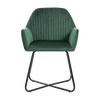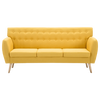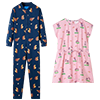Provide shelter, safety and comfort for your bird with a bird cage
Bird cages serve as essential sanctuaries for our feathered companions, offering a secure and comfortable living space for birds of all sizes. Beyond being a mere containment unit, bird cages play an important role in the physical and psychological well-being of birds, making them a must-have for responsible bird owners.
Ensuring safety and security
One of the primary functions of a bird cage is to provide a safe and secure environment for our avian friends. In the wild, birds face numerous threats from predators, harsh weather conditions and other dangers. A well-designed bird cage acts as a protective barrier, shielding them from potential harm and ensuring their safety within the controlled confines of their living space. This is particularly crucial for pet birds that may lack the survival instincts needed to navigate the hazards of an uncontrolled environment.
Privacy and comfort
Birds, like any other living beings, require a space where they can retreat for privacy and relaxation. A bird cage serves as a haven where birds can find solace, rest and a sense of security. It becomes their personal sanctuary, allowing them to escape the hustle and bustle of the outside world. This aspect is particularly important for species that are naturally more timid or reserved, as the enclosure provides a comforting retreat where they can observe their surroundings without feeling exposed or threatened.
Facilitating exercise and exploration
While the cage provides a secure space, it should also be spacious enough to allow for exercise and exploration. A well-designed bird cage incorporates perches, toys and varying levels. This encourages physical activity and mental stimulation. This is essential for the overall health of the bird, preventing issues such as obesity and boredom-related behaviours. Owners can enhance their birds' well-being by regularly introducing new toys, perches and even rotating the placement of items within the cage. This keeps the environment engaging and dynamic.
Promoting social interaction
Birds are social creatures that thrive on interaction with their human caregivers and, in some cases, with fellow avian companions. The bird cage acts as a centralised location for these interactions, fostering a bond between the bird and its owner. It also provides a platform for owners to monitor their pets closely, ensuring early detection of any signs of illness or distress.
Choosing the right bird cage
Selecting the ideal bird cage for your avian companion is more than just choosing a containment space; it's about creating a thriving habitat that caters to your bird's specific needs. From size considerations to accounting for activity levels and social dynamics, here's a creative guide to picking the perfect perch for your feathered friend.
-
Size: Birds, much like us, appreciate a bit of breathing room. When choosing a cage, think spacious. A roomy enclosure allows your bird to stretch its wings, hop around and engage in natural behaviours. As a general rule, the cage should be large enough to accommodate full wing extension and feature horizontal bars for climbing. Consider the specific species of bird you have; larger parrots, such as macaws, demand substantial space, while smaller finches may feel more secure in a cosier setting.
-
Activity level: Birds come in all personalities, from the energetic acrobatics of conures to the more contemplative perches of cockatiels. Tailor your cage choice to your bird's activity level. For high-energy species, look for a cage with ample space for toys, swings and climbing structures to keep them entertained. On the flip side, more laid-back birds may appreciate a larger horizontal space with cosy corners for peaceful moments of reflection.
-
A solo haven or a social hub: Consider the social dynamics of your bird. Some species thrive on companionship, while others prefer solitary living. If you have a social bird, a larger cage with multiple perches can accommodate the need for interaction. For more independent birds, a cosy yet spacious cage with plenty of toys for mental stimulation can be the perfect solo haven. Keep in mind that even solitary birds benefit from occasional out-of-cage interaction with their human companions.
-
Bar spacing: Ensure the bars of the cage are spaced appropriately to prevent escape attempts. Different bird species have varying needs in this regard. For smaller birds like budgies, a narrower bar spacing is essential, preventing any Houdini acts. Larger parrots, on the other hand, need sturdier bars to withstand their powerful beaks and prevent any great escapes.
-
Cleaning and maintenance: A well-designed cage is not just about your bird's comfort but also about your convenience. Opt for cages with removable trays for easy cleaning. Stainless steel or powder-coated cages are durable and resistant to rust. This ensures a long-lasting and aesthetically pleasing home for your feathered friend.
Must-have bird supplies for happy birds
Welcoming a feathered friend into your home is a joyous occasion, but ensuring their well-being involves more than just providing a cage and some seeds. From interactive toys that stimulate their minds to cosy perches that offer a comfortable retreat, here's a comprehensive guide to the must-have bird supplies that will make your avian companion feel right at home.
-
Bird cage: At the heart of every bird's sanctuary lies its cage. Choosing the right one is important for your pet's happiness and health. Opt for a cage that is spacious enough for your bird to move around comfortably, with horizontal bars for climbing and enough room for toys. Consider the material – stainless steel or powder-coated cages are durable and easy to clean. A well-ventilated cage with secure locks is essential for your bird's safety.
-
Perches and ladders: Perches are not just places for birds to rest; they are essential for foot health and exercise. Offer a variety of perch sizes and textures. This keeps your bird's feet healthy and engaged. Consider natural wooden perches, which provide a comfortable grip and add a touch of nature to the cage. Ladders are also great additions, allowing your bird to climb and explore different levels of its home.
-
Toys: Birds are intelligent and curious creatures that thrive on mental stimulation. A variety of toys can keep them engaged and prevent boredom-related behaviours. Include toys that encourage foraging, such as puzzle feeders and treat-dispensing toys. Interactive toys like mirrors, bells and hanging toys cater to your bird's playful instincts. Rotate toys regularly to keep the environment dynamic and prevent your bird from losing interest.
-
Cage accessories: Enhance your bird's living space with cage accessories that add comfort and convenience. Consider adding a cosy bird hammock for afternoon naps or a snuggle hut for birds that enjoy the feeling of being nestled. Cage skirts can help contain messes, and a cuttlebone or mineral block provides essential nutrients while satisfying your bird's natural desire to chew.
-
Bird food and feeders: A well-balanced diet is crucial for your bird's health. Provide bird food formulated for your specific species. Fresh fruits, vegetables and occasional treats contribute to a varied and nutritious diet. Invest in sturdy food and water dishes that can be securely attached to the cage. Ensure that freshwater is available at all times.
-
Grooming essentials: Maintaining your bird's plumage is essential for its overall health. Include grooming supplies like a bird bath or a misting spray to help your bird keep its feathers clean. Nail clippers designed for birds can be used to trim overgrown nails, while a beak conditioner can help keep the beak in good condition. Regular grooming not only ensures your bird looks its best but also prevents potential health issues.
-
First aid kit and vet contacts: Prepare for the unexpected by having a bird-friendly first aid kit on hand. Include items like styptic powder for minor bleeding, an antiseptic solution for wound cleaning and a bird-safe insecticide in case of mites or parasites. Keep the contact information for an avian vet readily available in case of emergencies. Regular check-ups with a qualified avian veterinarian are essential for preventive care and early detection of potential health issues.
-
Out-of-cage time: While the cage provides a secure home base, birds benefit greatly from out-of-cage time. Invest in a play stand where your bird can perch, play and explore in a safe environment. For outdoor adventures, consider a bird harness that allows your feathered friend to enjoy the fresh air while staying securely attached to you.































































